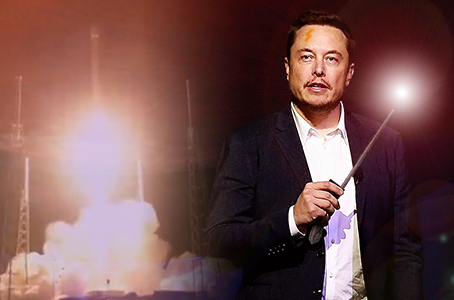Elon Musk and the mystery of the lost satellite
The launch of a government satellite was the most important mission of the space company of the also owner of Tesla, but suddenly everything was rarefied when apparently the object launched never appeared in space.

It was one of the most important things that Elon Musk has launched into space: a government satellite so secret that virtually everything is classified.
His code name: Zuma.
Only now, what was supposed to be a triumph for Musk and his Space Exploration Technologies Corp. (SpaceX) has become a possible setback after the satellite disappeared.
Details are scarce and it is not clear who, if anyone is at fault. But this is for sure: a SpaceX Falcon 9 rocket, with Zuma on board, crossed the Florida sky from Cape Canaveral on Sunday night and the first stage of the rocket safely returned to Earth. The team held within the space control room of SpaceX, in Hawthorne, California.
But something went wrong. By Monday night, Zuma was supposed to be lost. The US Strategic Command, which monitors more than 23,000 objects in space, said last night that it has not detected new satellites since launch.
The information on the second stage was not disclosed due to the confidentiality surrounding the mission. The second phase of the rocket drives the satellite into orbit.
The Wall Street Journal newspaper reported that congressional officials who were not publicly named and who were informed about the mission said that apparently the satellite had not separated in the second stage, which had been submerged in the atmosphere and burned.
Source by
The episode is shaping up as a test for the billionaire's ambitions in space, especially SpaceX's ability to compete in military missions.
"They are concerned that any failure could hamper their ability to obtain future national security launch contracts," said Brian Weeden, director of program planning at Secure World Foundation, a space policy think tank. "National security payloads are a very important potential market for SpaceX."
Gwynne Shotwell, director of operations for SpaceX, issued a strong statement Tuesday.
"After reviewing all the data to date, Falcon 9 did everything correctly on Sunday night," he said. SpaceX declined to comment further, citing the mission's classification status, as did Northrup Grumman Corp., which hired SpaceX as the launch contractor.
The SpaceX review so far indicates that "no design, operational or other changes are needed," Shotwell said. The company does not foresee any impact on its upcoming launch schedule, including a Falcon 9 mission in three weeks.
PROBABLE INVESTIGATIONS
"There is a long tradition of not discussing problems with classified missions, unless it explodes in such a way that everyone can see it," said John Logsdon, founder and former director of the Space Policy Institute at George Washington University.
"There will be at least three investigations, SpaceX will go ahead to make sure they are not part of the problem," he said. "There will be an internal investigation at Northrup Grumman, and the sponsoring agency will do an investigation, it did not matter what Zuma was, it was expensive."
Whatever the cause, the setback could hardly come at a worse time for Musk. Just days before Sunday's launch, its flagship company, Telsa, once again delayed its production target for its Model 3 sedan. Which raised questions about whether the electric car company would have to raise cash.
SpaceX, which remains private, meanwhile, is heading for what is expected to be a busy year. The company has said it plans about 30 missions in 2018 after completing a record 18 last year.
NEW FLIGHT
SpaceX is scheduled to demonstrate the inaugural flight of Falcon Heavy, a larger and more powerful rocket, later this month. And along with Boeing, it has a contract with NASA to send astronauts to the International Space Station as part of the "Commercial Crew" program, with the first crucial test flight scheduled for the second quarter.
Zuma was the third military launch of SpaceX. The Falcon 9 won the United States Air Force certification for the national security space missions in May 2015, breaking a blockade maintained by the United Launch Alliance, a joint venture between Boeing and Lockheed Martin Corp.
Contracts for military launches include satellites that allow troops to communicate on battlefields and are estimated to be valued at around 70 billion dollars until 2030.

If it was a separation problem it could have been a problem with the satellite itself and nothing to do with the launch vehicle.